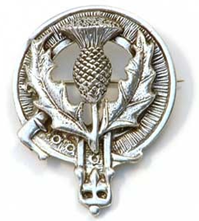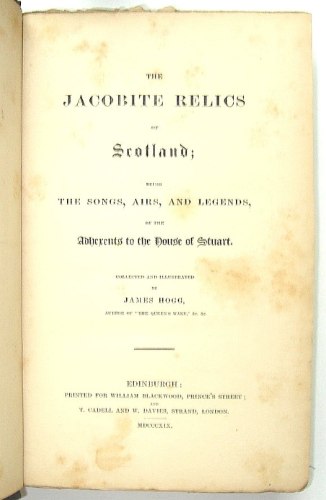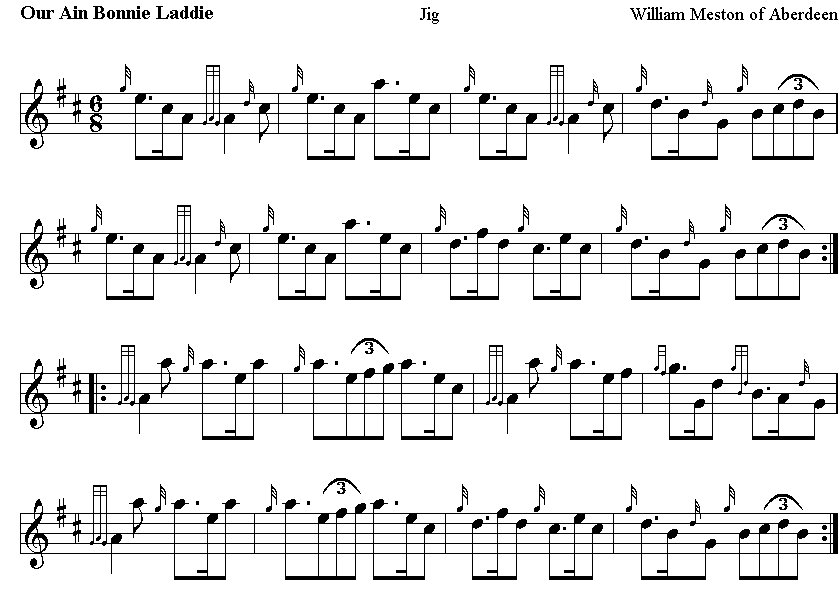
Best viewed in
Internet Explorer
Music (PDF)
Music (BMW)
Back to

Updated
11/15/2019 |

Our Ain Bonnie Laddie
William Meston of Aberdeen
|
The author of this song was William Meston (1688 - 1745)
of Midmar in Aberdeenshire. The son of a blacksmith he
was the sometime preceptor to the young (10th) Earl
Marischal and his brother, the celebrated Marshall
Keith. By their interest, he was promoted to the
professorship of philosophy in Marischal College
(Aberdeen), but he lost it in consequence of following
their fortunes in 1715. As a compensation, he was made
governor of Dunotter Castle by the earl Marischal. After
the battle of Sherrifmuir, till the Act of Indemnity was
passed, he lurked with a few fugitive associates, for
whose amusement he wrote several burlesque poems, to
which he gave the title of Mother Grim's Tales.
The Countess Marischal of Elgin supported him during the
decline of his latter days, till he removed to Aberdeen,
where he died of a languishing distemper. He was a man
of wit and pleasantry in conversation, and of
considerable attainments in classical and mathematical
knowledge.
This tune was used by James Hogg in his collection,
The Jacobite Reliques of Scotland: being the Songs, Airs
and Legends of the Adherents to the House of Stuart.
James Hogg (1770 – 21 November 1835) was a Scottish
poet, novelist and essayist who wrote in both Scots and
English. As a young man he worked as a shepherd and
farmhand, and was largely self-educated through reading.
He was a friend of many of the great writers of his day,
including Sir Walter Scott, of whom he later wrote an
unauthorized biography. He became widely known as the
"Ettrick Shepherd", a nickname under which some of his
works were published, and the character name he was
given in the widely read series Noctes Ambrosianae,
published in Blackwood's Magazine. He is best
known today for his novel The Private Memoirs and
Confessions of a Justified Sinner. His other works
include the long poem The Queen's Wake (1813),
his collection of songs Jacobite Reliques (1819),
and his two novels The Three Perils of Man
(1822), and The Three Perils of Woman (1823).
 |
|
Lyrics by William Meston
|
|
How long shall our land thus suffer
distresses,
Whilst traitors and strangers and
tyrants oppress us?
How lang shall our old and once brave
warlike nation,
Thus tamely submit to a base usurpation?
(twice)
Still must we be sad, whilst the
traitors are wadie,
'Till we get a sight of our ain bonny
laddie.
Still must we be sad, whilst the
traitors are wadie,
Till we get a sight of our ain bonny
laddie. (twice)
How lang shall we lurk, how lang shall
we languish,
With our faces dejected, and our hearts
full of anguish ?
How lang shall the W[hig]s, perverting
all reason,
Call honest men rogues, and
loyalty treason?
Still must we be sad, whilst the
traitors are wadie,
Till we get a sight of our ain bonny
laddie.
Still must we be sad, &c. |
O Heavens, have pity! with favour
present us;
Rescue us from strangers that sadly
torment us,
From Atheists, and Deists, and
W[higgi]sh opinions;
Our K[in]g return back to his rightful
dominions:
Then rogues shall be sad, and honest
men wadie,
When the throne is possess'd by our ain
bonny Laddie
Then rogues shall be sad, &c.
The church, that's oppressed, our
Monarch shall cherish;
The land shall have peace, the Muses
shall flourish;
Each heart shall be glad, but the
W[hig]s will be sorry,
When the K[in]g gets his own, and
JEHOVAH the glory.
Then rogues shall be sad, but the
honest men wadie,
When the throne is possess'd by our ain
bonnie laddie.
The rogues shall be sad, &c. |
|
|
|
|



